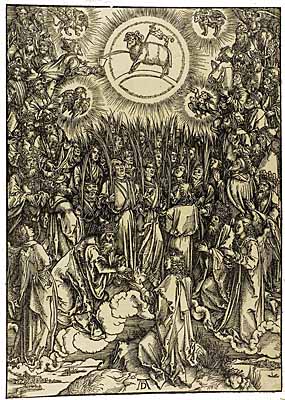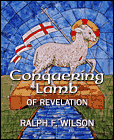
|
Old Testament
New Testament
Gospels
Acts
Paul's Letters
General Letters
Revelation
Topical Studies
Beginning the Journey (for new Christians). en Español

|
Old Testament
New Testament
Gospels
Acts
Paul's Letters
General Letters
Revelation
Topical Studies

|
Home
Bible Studies
Articles
Books
Podcasts
Search
Menu
Donate
About Us
Contact Us
FAQ
Sitemap
Day 8. The Great Multitude Praising the Lamb (Revelation 7:9-12)
 Albrecht Dürer, Adoration of the Lamb (1497-1498), woodcut print, Metropolitan Museum of Art, New York. Larger image. |
We spent several days observing and meditating as the grand throne room is described in Revelation chapters 4 and 5. Then the scene shifted to an increasing crescendo of judgment in chapter 6, as the Lamb opens each of the first six seals -- the first four seals releasing the Four Horsemen of the Apocalypse. Seal 5 reveals the souls of the martyrs are seen under the altar. Then Seal 6 of judgment reveals a cataclysm in earth and sky, with the rich and powerful hiding in caves and crying out, "Hide us from the wrath of the Lamb." Following this we see those sealed as God's servants -- 144,000, a symbolic number of 12 times 12 times the indeterminately large number of 1,000. We'll come back to the 144,000 on Day 13.
Now John sees a great multitude. We'll camp on this passage for the next few days to delve deeper into what it is saying about the Lamb.
"9 After this I looked, and behold, a great multitude that no one could number, from every nation, from all tribes and peoples and languages, standing before the throne and before the Lamb, clothed in white robes, with palm branches in their hands, 10 and crying out with a loud voice,
'Salvation belongs to our God who sits on the throne, and to the Lamb!'
11 And all the angels were standing around the throne and around the elders and the four living creatures, and they fell on their faces before the throne and worshiped God, 12 saying,
'Amen! Blessing and
glory
and wisdom and thanksgiving
and honor and power and might
be to our God forever and ever! Amen.'" (Revelation
7:9-12)
The Great Multitude (Revelation 7:9)
Notice the make-up of this great multitude.
- All nations (ethnos),
- All tribes (phylē),
- All peoples (laos), and
- All languages (glossa).34
They are dressed all in white, waving palm branches, and shouting out praises to the Lamb. Hallelujah.
One of my privileges is to have an international ministry, with subscribers to my newsletter and Bible studies from at least 150 countries around the world where the Christian movement has extended. In the massive crowd gathered before the Lamb you'll find:
- Ecuadorians and Peruvians, Mexicans and the Pawnee, their faces bearing the features of their ancestors who crossed over to the Americas along some kind of Bering land bridge many thousands of years ago.
- Africans from above the Sahara -- Egypt and Libya and others -- and below, from Kenya and the Congo, Nigeria, and Ghana. I can see their sparkling smiles as they praise the Lamb with great joy.
- Aborigines will be there, too, side by side with the Australians who emigrated from Europe.
- Pacific Islanders dressed in white will be rejoicing before the throne.
- Asians from the cold reaches of the Arctic Circle, Manchuria and Nepal, the Han Chinese and Koreans, Japanese and Vietnamese, Burmese and Thai are all present, waving palm branches before the King, with the Filipinos and Malaysians.
- The Indians will be there from the sub-continent of Asia, dressed in white, with the Persians and Afghanis and Pakistanis, smiles on their faces and joy in their voices.
- The Europeans and their North and South American descendants will be there -- the descendants of the Celts and Goths and Saxons, the Romans and the Greeks, the Norsemen and Danes, the Russians and the Slavic peoples. None will be missing, as the Gospel has gone to each of these regions in great waves of evangelism more than once.
- And, of course, the Jews and Palestinians, Syrians, Saudis, and the descendants of the Babylonians will be present.
- And the tens of thousands of people groups I've left out of my quick summary will be there too, clothed in white robes, shouting praise, lifting hands and palm branches, and rejoicing before the Lamb and Him who sits upon the throne.
I recall the African American spiritual, "He's got the whole world in his hands," and saints from the whole world, pole to pole, every nationality, every race, are lifting hands to him.
Salvation (Revelation 7:10b)
The white-robed throng is shouting -- whether in their own native language or a heavenly language we do not know:
"Salvation belongs to
our God who sits on the throne,
and to the Lamb!" (Revelation 7:10b)
As you may recall from Days 1 and 6, those around the throne are attributing or ascribing mighty blessings and attributes and victories to God as acts of praise. Here, the victory is "salvation"35 -- that is, rescue from danger. The danger, of course, is judgment and condemnation. God has brought salvation by sending his own Son to die for and thus atone for our sin. He came as "the Lamb of God who takes away the sin of the world" (John 1:29). And by this amazing act of love, he has forever saved us who believe in him. Hallelujah. May his name be praised forever!
Angels, Elders, and Living Creatures Join in Praise (Revelation 7:11-12)
"11 And all the angels were standing around the throne and around the elders and the four living creatures, and they fell on their faces before the throne and worshiped God, 12 saying,
'Amen! Blessing and
glory
and wisdom and thanksgiving
and honor and power and might
be to our God forever and ever! Amen.'" (Revelation
7:11-12)
Here, from a position of prostration before the throne, again they worship with a seven-fold blessing of God.
On Day 6 we saw such a seven-fold praise or acknowledgement of God's greatness. Here it is again, slightly different but louder still.lamb-revelation-web-full1.htm
|
Revelation 5:12 Power (dynamis)Wealth Wisdom Might (ichys) Honor Glory Blessing |
Revelation 7:12 BlessingGlory Wisdom Thanksgiving Honor Power (dynamis) Might (ichys) |
 Available in PDF, and Kindle formats, |
The elements of this praise are similar to those in Revelation 5:12, though in a different order. "Thanksgiving, thanks" (eucharistia36) is added and "wealth" (ploutos) is omitted.
Prayer
O Lord, I can almost see that Day when throngs of white-robed saints will be praising the Lamb before the throne. And I'll be there too, with my brothers and sisters from all over the world. What a day! Give us such an appreciation of what you've done that we can laud you for your full salvation, and chant with the elders and angel host around the throne the words, "Blessing and glory and wisdom and thanksgiving and honor and power and might be to our God forever and ever!" Yes! Amen!
Day 8 Meditation (Revelation 7:9-12). Why do you think
worship before the throne is such a theme of Revelation? What are the
implications of this band of white-robed saints before the throne for our
relationships with minority peoples in our own cities and countries? How dare we
no longer act? How must we act towards these who are different, but very much
the same as we?
https://www.joyfulheart.com/forums/topic/1882-day-8-multitude/
Endnotes
(References and Abbreviations)
[34] "Multitude" is ochlos, "a relatively large number of people gathered together, crowd" (BDAG 1bβ). "Nation" is ethnos, "a body of persons united by kinship, culture, and common traditions, nation, people" (BDAB 276, 1). "Tribes" (ESV, NIV, NRSV), "kindreds" (KJV) is phylē, "a subgroup of a nation characterized by a distinctive blood line, tribe" (BDAG 1069, 1). "Peoples" is laos (from which we get the word "layman" or "laity"), "a body of people with common cultural bonds and ties to a specific territory, people-group, people as nation" (BDAG 586, 3). "Languages" (NIV, NRSV, ESV), "tongues" (KJV) is glossa, "a body of words and systems that makes up a distinctive language, language, tongue" (BDAG 201, 2b).
[35] "Salvation" is sōtēria, "salvation. In the three places in Revelation in which sōtēria appears as part of a doxology we have a Hebraism (salvation as victory intimately associated with God) Revelation 7:10; 12:10; 19:1, such as in Psalm 3:9 (BDAG 986, 2).
[36] "Thanksgiving" (ESV, NRSV, KJV), "thanks" (NIV) is eucharistia, "the expression or content of gratitude, the rendering of thanks, thanksgiving" (BDAG 416, 2). From eucharistia we derive the word Eucharist, one name for the Lord's Supper.
Copyright © 2025, Ralph F. Wilson. <pastor![]() joyfulheart.com> All rights reserved. A single copy of this article is free. Do not put this on a website. See legal, copyright, and reprint information.
joyfulheart.com> All rights reserved. A single copy of this article is free. Do not put this on a website. See legal, copyright, and reprint information.

